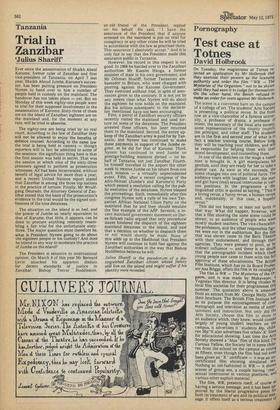Tanzania
Trial in Zanzibar
'Julius Shariff'
Ever since the assassination of Shaikh Abeid Karume, former ruler of Zanzibar and first vice-president of Tanzania, on April 7 last year, Shaikh Aboud Jumbe, Karume's successor, has been putting pressure on President. Nyrere to hand over to him a number of people held in custody on the mainland. The handover has not taken place — yet. But on Monday of this week eighty-one people went to trial for their supposed involvement in the assassination of Karume. Sixty-three of them are on the island of Zanzibar; eighteen are on the mainland and, for the moment at any rate, will be tried in absentia.
The eighty-one are being tried by no real court. According to the law of Zanzibar they will not be allowed to enjoy the benefits of defence counsel. According to the same law the trial is being held in camera — though reporters will in fact be admitted to some of the sessions: the significant thing here is that the first session was held in secret. That was the session at which nine of the sixty-three prisoners agreed to perform as prosecution witnesses. All had been incarcerated, without benefit of legal advice for more than a year; and a recent United Nations report stated that Zanzibar is among the three top nations in the practice of torture. Finally, Mr Woulfgang Dourado, the Attorney General of Zanzibar stated that the basis of the prosecution's evidence in the trial would be the signed confessions of the nine detainees.
The situation on the island is so bad, and the power of Jumbe so nearly equivalent to ' that of Karume, that little, it appears, can be done to procure anything remotely resembling a fair trial for the unfortunate sixtythree. The major question must therefore be, what is President Nyrere going to do about tne eighteen people in his custody? And does he intend in any way to moderate the practice. of Jumbe on the island?
The President is sensitive to international opinion. On March 8 of this year Mr Bernard Levin attacked his apparent disdain for decent standards of justice in Zanzibar. Bishop Trevor Huddleston,
an old friend of the President, replied on his behalf. He said, "I have the assurance of the President that if anyone arrested on the mainland is put on trial for conspiracy or any other crime he will be tried in accordance with the law as practised there. This assurance I absolutely accept." And it is only fair to say that the President made this assurance public in Tanzania.
However, his record in this respect is not good. In 1968 he handed over to the Zanzibari authorities Mr Kassim Hanga, a former minister of state in his own government, and Mr Othman Shariff, former Tanzanian ambassador to Britain, who were charged with plotting against the Karume Government.
They executed without trial, in spite of assurances given to the contrary. It is not yet by any means clear what Nyrere will do about the eighteen he now holds on the mainland, But his actions subsequent to the declaration mentioned have not been encouraging.
First, a patrol of Zanzibari security officers recently visited the mainland and used tor ture on some of the detainees. The President arrested these officers, but later returned them to the mainland. Second, the entire up keep of the Zanzibari army is paid for by Tan zania; and Nyrere has continued to make these payments in support of the Jumbe re gime, as he did for that of Karume. Third, Nyrere has continued to send Jumbe on prestige-building missions abroad — on be half of Tanzania, not just Zanzibar. Fourth, he himself travelled to the airport the other week to receive Jumbe on his return from one such mission — a virtually unprecedented event. Fifth, after a recent congress of the Afro-Shirazi (Jumbe's and Karume's) Party which passed a resolution calling for the pub lic execution of the detainees, Nyrere blessed the proceedings. Sixth, immediately after this congress Nyrere told a rally of his own Tan zanian African National Union Party on the mainland that he and they should emulate the fine example of the ASP. Seventh, a re cent mainland government statement on Dares-Salaam radio argued that only procedural issues hindered the dispatch of the eighteen mainland detainees to the island, and said that a decision on whether to despatch them or not would shortly be made. None of this adds up to the likelihood that President • Nyrere will continue to hold fast against the Zanzibari authorities in the way that Bishop Huddleston believes he will.
Julius Shariff is the pseudonym of a distinguished Zanzibari citizen whose jamily still live on the island and might suffer if his identity were revealed.


































 Previous page
Previous page